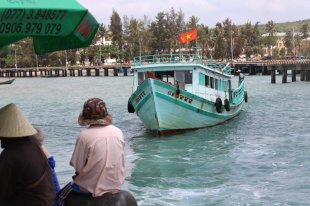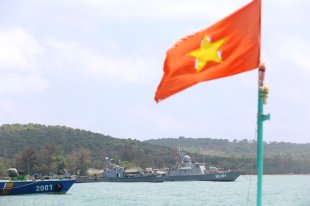Looking for MH370 rescuers: The wild goose chase across Vietnam
KUALA LUMPUR, March 13 — After racing hundreds of kilometres across Vietnam — from Ho Chi Minh City to Ca Mau at the country’s southern tip, and then up to the Kien Giang province — I finally reached Phu Quoc Island, where Vietnamese search and rescue operations for the missing Malaysia Airlines flight MH370 is located.
Travelling together with my colleague, photographer Choo Choy May, and two reporters from Oriental Daily and Sinar Harian — Yap Jia Hee and Farah Zamira Farush Khan — there was a palpable sense of relief when we arrived at the air traffic control tower near the Phu Quoc International Airport, where Vietnamese authorities hold twice daily press conferences on the progress of their search.
We arrived on Tuesday, Day 4 of the search for MH370 since the Boeing 777 plane carrying 239 people disappeared from civilian radar over the South China Sea early Saturday morning. We left for Vietnam on the same day itself.
At the first press conference we attended, Vietnam’s deputy transport minister Pham Quy Tieu said that he feared the worst, after a massive air and water search by 10 countries failed to bear fruit thus far, with many leads panning out.
A dozen nations are now taking part in the search that has since been expanded to an area of more than 90,000 square kilometres — that is equivalent to roughly the size of Portugal — including the Straits of Malacca and the Andaman Sea.
Pham’s remarks were a brutally honest assessment of the situation, compared to those by Malaysian authorities who said yesterday that they still had “hope” in finding survivors.
But at Phu Quoc Island, it was difficult to know just how transparent or forthcoming the Vietnamese government was as I did not understand Vietnamese.
After each press conference, I would approach local reporters to get a translation. During such news conferences, we can pose questions in English, which an interpreter would translate to the Vietnamese official.
But the answers would not be translated back to English, making it impossible to know just how much the Vietnamese official understood the questions.
May and I were recalled back to Malaysia after Vietnam’s announcement yesterday morning that search and rescue operations would be frozen.
So, just as quickly as we had come to Vietnam, May and I had to race back to Malaysia on the earliest available flight from Phu Quoc Island to Ho Chi Minh City, and finally to Kuala Lumpur.
The return trip was certainly faster than our journey to the island itself.

We were in Vietnam for four days. That doesn’t seem like a long time, but travelling some 700 kilometres by bus, van, motorbike and ferry in the span of just about two days stretches the hours.
This was my first overseas assignment as a reporter.
I had covered the Lahad Datu conflict in Sabah last year too, but there at least, I could understand the language and build my network easily through the local reporters.
In Vietnam, nobody really speaks English, except for hotel staff in general. None of the Vietnamese authorities I met spoke English. Getting around was also a challenge as the taxi drivers don’t speak English either.
The places that we needed to go to — like the army headquarters or a naval base — are not typical tourist spots. But thank goodness for Google Translate, a handy tool for getting around in a foreign country. A must-have for every journalist.

I came to Vietnam on Saturday night hoping that MH370 and its survivors would be found within a day or two. After 24 hours lapsed, I expected to find wreckage and bodies. But that did not happen either.
Five days after MH370 was last seen en route from Kuala Lumpur to Beijing, there is still no trace or evidence of the jetliner. Finding the 210-foot-long plane is akin to looking for a needle in a haystack, as The Washington Postillustrates beautifully.
Relatives of the 239 passengers and crew — most of whom were China nationals — are left wondering in agony if, hope against hope, their loved ones are still alive.
That is the real tragedy of MH370; not finding closure for the friends and family of the people on board the plane.
Fatigue is already setting in. Countless theories by aviation experts have been dissected and tossed around for days. But without a single shred of evidence, the MH370 crisis will die out soon by the weekend.
And the families will have to make the painful decision of when to start the grieving process for their loved ones who seem to have vanished into thin air.
- sumber


menurut hishamuddin; ada tuduhan yg mengatakan pihak berkuasa vietnam telah menghentikan operasi SaR. ini tidak betul sama sekali. malah pihak vietnam mungkin akan membenarkan pencarian di luaskan sehingga memasuki boarder mereka!
ReplyDeleteWTF...hishamuddin ckp lain,pdhal wartawan yg pergi vietnam sendiri ckp yg diorang kena recall back psl kerajaan vietnam umum membekukan SaR mereka! telus lah wahai hishamuddin...jgn ckp putar belit